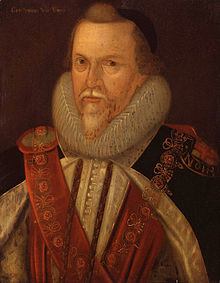Thomas Cecil, 1st Earl of Exeter
Thomas Cecil, 1st Earl of Exeter KG Kt ( May 5, 1542 - February 7, 1623 ) was an English soldier and politician.
Life
He was the eldest son of William Cecil, 1st Baron Burghley and his first wife Mary. A half-brother was Robert Cecil . At first he was tutored by private tutors with other descendants of the family. To complete his training, his father sent him to Paris with a companion . There Thomas Cecil devoted himself more to pleasure and less to study. His cavalier journey took him to Antwerp , Speyer , Heidelberg and Frankfurt am Main before he returned to England in 1563.
Through the influence of his father, Thomas Cecil became a Member of the House of Commons in 1563 . He represented the Borough of Stamford in Lincolnshire . This seat was traditionally occupied by members of the Cecil family. He then represented the place two more times (1571, 1572). He did not take part in the debates during the first two terms. In his subsequent terms he was a member of numerous committees and participated in the debates.
His father also arranged to marry Dorothy Nevill in 1564. She was a daughter of John Nevill, 4th Baron Latymer . The couple had thirteen children, five sons and eight daughters, including his heirs William Cecil and Edward Cecil .
In 1569, Thomas Cecil took part in the suppression of a revolt of the Earls in northern England as commander of 300 horsemen. In 1573 he helped the Scottish regent James Douglas, 4th Earl of Morton, capture Edinburgh Castle . During a tournament, Elisabeth I beat Thomas Cecil to a Knight Bachelor degree in 1575 .
In 1584 and 1586 he represented Lincolnshire as Knight of the Shire in the House of Commons. When Robert Dudley, 1st Earl of Leicester led troops to the Netherlands in support of the anti-Spanish rebels in 1585 , Thomas Cecil was there as a cavalry officer. He soon became governor of the British-controlled port city of Brielle . Due to illness, he soon had to give up the post. In 1588, during the attempted invasion of the Spanish Armada , he was a colonel in a unit in defense of the Queen. In 1592 and 1597 he was Knight of the Shire for Northamptonshire .
In 1590 he took ownership of the Manor House at Wimbledon . He had a new representative manor house built with a large garden and vineyard. The queen was a frequent guest there. She was appointed Lord Lieutenant of York and President of the Council of the North . This involved the duty to track down secret Catholics. He performed this task rather negligently. When his father died in 1598, he inherited his title of nobility as 2nd Baron Burghley and thus became a member of the House of Lords .
In 1601 he supported his brother Robert Cecil as a colonel general in suppressing the uprising of Robert Devereux, 2nd Earl of Essex . In gratitude, he was accepted into the Order of the Garter in the same year . After King James I ascended the throne, he was appointed a member of the Privy Council . In 1605 the king made him Earl of Exeter while his brother Robert became Earl of Salisbury .
His first wife died in 1609. In 1610 he married Frances Smith, widow of Sir Thomas Smith and daughter of William Brydges, 4th Baron Chandos . This marriage resulted in a daughter who died early.
In poor health, he withdrew more and more from the public, even when the King visited him at Wimbledon in 1616. A year later, he was confronted with his wife Frances being accused of a plot to poison Lady Lake, wife of a senior official. Thomas Cecil appealed to the king and he himself took over the presidency of the Star Chamber's court . The court found the accused innocent, while Lady Lake and her husband were imprisoned in the Tower of London for life .
At his death, Thomas Cecil was one of the richest men in England and owned three great castles and properties with Wimbledon, Burghley House and Exeter House in the Strand . He has generously supported Clare College , Cambridge .
He was buried with his wife and some of his children in Westminster Abbey . A tomb commemorates him.
literature
- Richard Milward: Cecil, Thomas, first earl of Exeter (1542-1623). In: Oxford Dictionary of National Biography . Oxford University Press, 2004. Accessed online August 12, 2013
- Alan Palmer, Veronica Palmer: Who's Who in Shakespeare's England. New York 1999, p. 43f.
- PW Hasler: CECIL, Thomas (1542-1623), of Burghley House, Lincs. and Wimbledon, Surr. In: The History of Parliament: the House of Commons 1558-1603. London 1981 online version
Web links
- Thomas Cecil, 1st Earl of Exeter on thepeerage.com
Individual evidence
- ^ William Arthur Shaw: The Knights of England. Volume 2, Sherratt and Hughes, London 1906, p. 76.
- ^ William Arthur Shaw: The Knights of England. Volume 1, Sherratt and Hughes, London 1906, p. 29.
- ↑ entry to westminster-abbey.org
| predecessor | Office | successor |
|---|---|---|
| New title created |
Earl of Exeter 1605-1623 |
William Cecil |
| William Cecil |
Baron Burghley 1598-1623 |
William Cecil |
| personal data | |
|---|---|
| SURNAME | Cecil, Thomas, 1st Earl of Exeter |
| ALTERNATIVE NAMES | Cecil, Thomas, 2nd Baron Burghley |
| BRIEF DESCRIPTION | English military and politician |
| DATE OF BIRTH | May 5, 1542 |
| DATE OF DEATH | February 7, 1623 |

